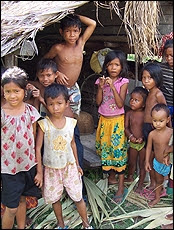 The presence of Westerners in a remote Cambodian village causes a stir with the local children. (Herald photo by Jennifer Roes)
The presence of Westerners in a remote Cambodian village causes a stir with the local children. (Herald photo by Jennifer Roes)Sunday, August 26, 2007
By Jennifer Roes
Boston Herald (Mass., USA)
PHNOM PENH, Cambodia - Sweet shouts of “Hello!” greet our gaggle of volunteers from Massachusetts as the local kids, surprised to see Westerners so far off the tourist track, try out their limited English. It’s hard at every step to reconcile their openness and desire to learn with the knowledge that many are destined for a life of poverty, assuming they avoid malaria, AIDS and human traffickers.
“It is amazing how people seem so happy who have so little,” said Rachel Schatz, one of eight of us from Park Street Church in Boston who spent two weeks in this mystical but ravaged land in August. “Cambodians are all so generous.”
Our group spent two weeks in Cambodia, teaching English to adult staff members of World Relief, a church-based aid organization. Most of the time, I felt more like the student than the teacher.
The Cambodians I encountered embodied warmth and grace - impressive, considering their recent history. In the last 30 years the country has endured genocide, civil war, rampant government corruption, human trafficking and epidemics of poverty and disease.
Memories of the fantastic colors and textures of market fruits compete in my mind with grim images of piles of skulls at a monument to victims of the Khmer Rouge. Merchants make a thin living selling fine silks and crafts, while a band made up of land-mine survivors struggles for survival playing their music and selling their CDs.
Tourists flock to one of the world’s great architectural feats, Angkor Wat, built by the ancient Khmers around 1100, while Cambodians live in makeshift lean-tos along city streets or, in the country, in one-room huts on stilts.
A typical resident makes less money in six months than many Americans make in a week. Yet my students took us for soup and gave us gifts when we left that could have cost them a day’s wages.
Cambodia’s hope for change lies with nongovernmental organizations like World Relief. Its programs help mothers raise healthy children, teach kids about health and hygiene and give people a chance to start or expand small businesses (information: http://cambodia.wr.org/). There’s much reason to fear for the future of Cambodia. But seeing the excitement of the village children during lessons there, it’s possible to believe there’s reason to hope, too.
Jennifer Roes is a member of the Herald staff.
“It is amazing how people seem so happy who have so little,” said Rachel Schatz, one of eight of us from Park Street Church in Boston who spent two weeks in this mystical but ravaged land in August. “Cambodians are all so generous.”
Our group spent two weeks in Cambodia, teaching English to adult staff members of World Relief, a church-based aid organization. Most of the time, I felt more like the student than the teacher.
The Cambodians I encountered embodied warmth and grace - impressive, considering their recent history. In the last 30 years the country has endured genocide, civil war, rampant government corruption, human trafficking and epidemics of poverty and disease.
Memories of the fantastic colors and textures of market fruits compete in my mind with grim images of piles of skulls at a monument to victims of the Khmer Rouge. Merchants make a thin living selling fine silks and crafts, while a band made up of land-mine survivors struggles for survival playing their music and selling their CDs.
Tourists flock to one of the world’s great architectural feats, Angkor Wat, built by the ancient Khmers around 1100, while Cambodians live in makeshift lean-tos along city streets or, in the country, in one-room huts on stilts.
A typical resident makes less money in six months than many Americans make in a week. Yet my students took us for soup and gave us gifts when we left that could have cost them a day’s wages.
Cambodia’s hope for change lies with nongovernmental organizations like World Relief. Its programs help mothers raise healthy children, teach kids about health and hygiene and give people a chance to start or expand small businesses (information: http://cambodia.wr.org/). There’s much reason to fear for the future of Cambodia. But seeing the excitement of the village children during lessons there, it’s possible to believe there’s reason to hope, too.
Jennifer Roes is a member of the Herald staff.

























No comments:
Post a Comment